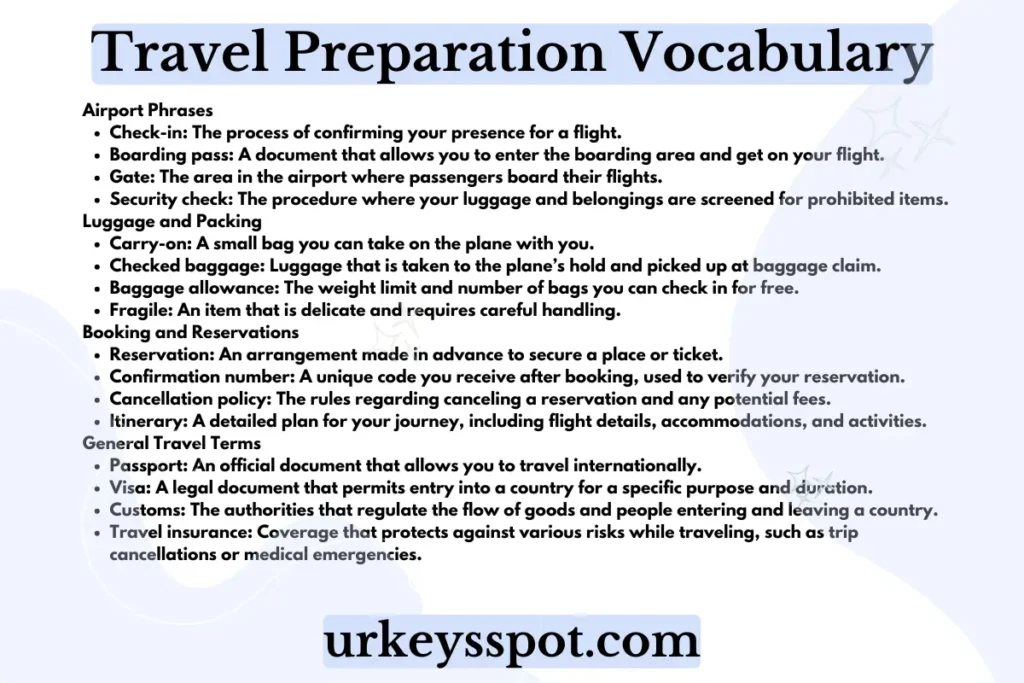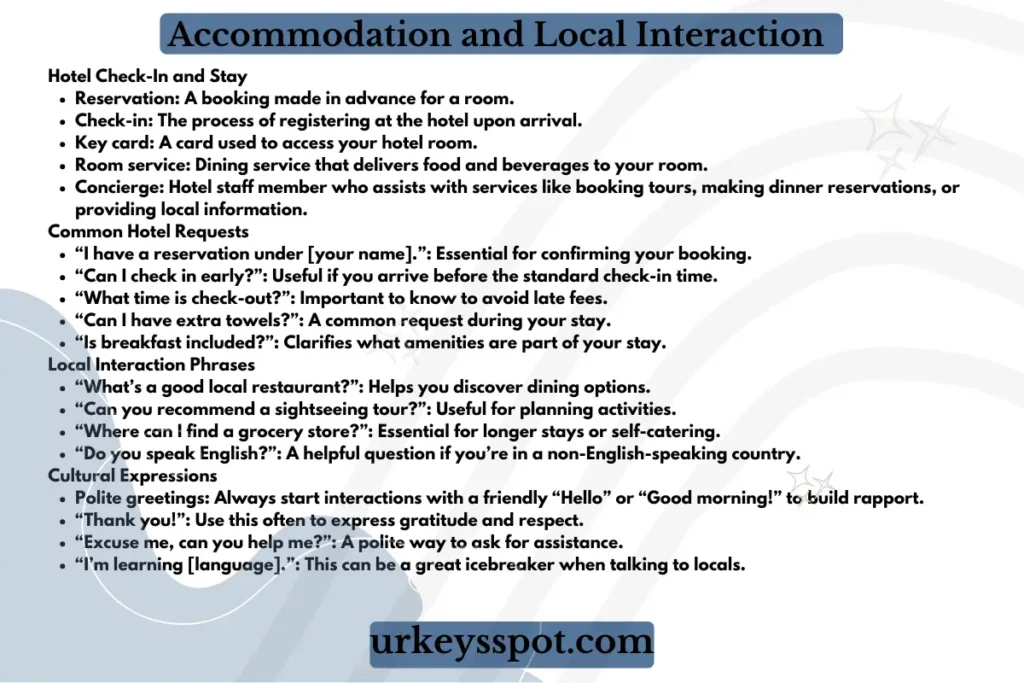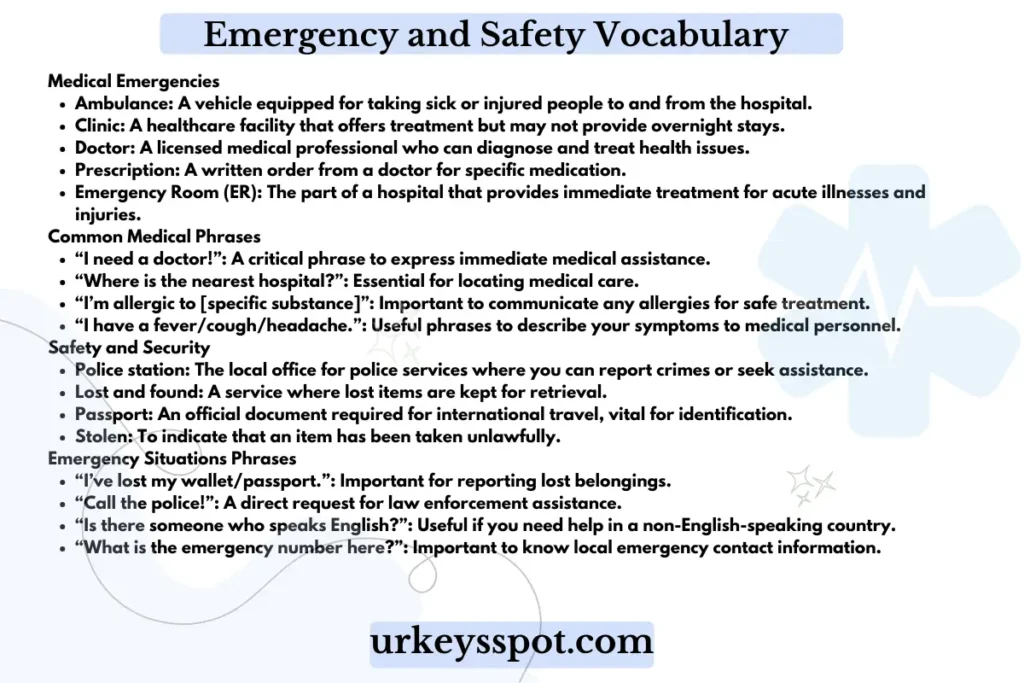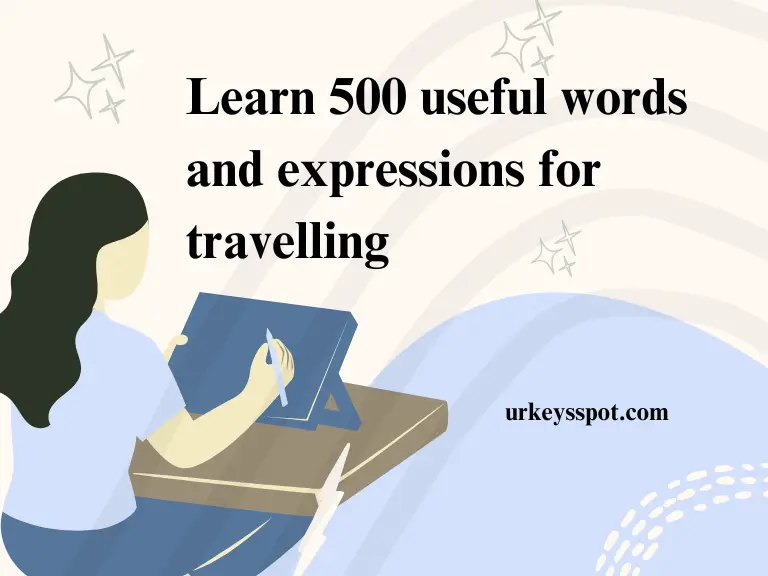Introduction
Traveling is a thrilling adventure, but let’s face it—language barriers can turn a simple question into a confusing puzzle. Whether you’re asking for directions, ordering a meal, or navigating customs, having a repertoire of 500 travel words and expressions can transform your trip into a smoother, more enjoyable experience. This guide dives into the must-know phrases that cover every aspect of your journey, from booking a ticket to managing emergencies. Let’s embark on this linguistic journey together!
Travel Preparation Vocabulary
Airport Phrases
From check-in to boarding, airports are often the first hurdle in your travel experience. Knowing the right words can make the process less stressful. For instance:
- “Where’s the check-in counter?”
- “Is this the queue for international flights?”
- “Can you please tag this as fragile?”
You might also encounter instructions like:
- “Please remove your laptop for screening.”
- “Do you have liquids over 100ml?”
It’s helpful to familiarize yourself with these terms to avoid last-minute surprises. For more practical phrases, check out resources like Preply’s travel guide【9】.
Luggage and Packing
Proper communication about luggage can save you headaches. Key phrases include:
- “How many bags am I allowed to check in?”
- “What’s the weight limit for carry-ons?”
Knowing how to say “My luggage is lost” in an emergency is equally crucial. Words like checked baggage, carry-on, and overweight fees pop up frequently.
Booking and Reservations
Booking tickets and making reservations often require clarity. Common phrases include:
- “Can I book a direct flight to Paris?”
- “Are there any seats available near the window?”
- “Do you have a vegetarian meal option?”
For accommodations, try saying:
- “Does this room have free Wi-Fi?”
- “What’s your cancellation policy?”
Getting Around
Transportation Phrases
Navigating a new city can be daunting, but with the right vocabulary, it becomes much easier. Here are some essential phrases to help you get around by various modes of transport:
- “How much is a ticket to the city center?”
- “Where’s the nearest bus stop?”
- “Does this train go directly to the airport?”
You might need to clarify:
- “Is there a discount for students or seniors?”
- “When’s the next departure?”
Understanding terms like return ticket, off-peak fares, and platform number can make your transit seamless. Asking for help, such as “Can you show me the way to platform 6?”, shows courtesy and builds trust.
Directions and Navigation
Getting lost is part of the adventure, but knowing how to ask for and understand directions is invaluable. Common phrases include:
- “Can you point me toward the main square?”
- “How far is it to the nearest metro station?”
- “Which way to the museum?”
If you’re driving, you might need:
- “How do I get to the highway?”
- “Is there parking nearby?”
Use phrases like turn left, go straight ahead, or it’s on your right for clarity. Some places might not speak your language, so using gestures or simple words can work wonders.
Emergency Travel Phrases
No one likes to think about emergencies, but being prepared is essential. Whether you’ve lost your way or need urgent help, here are key expressions:
- “I’m lost. Can you help me?”
- “I need to call my embassy.”
- “Is there a hospital nearby?”
Knowing how to express urgency is vital:
- “Please call the police.”
- “I need a taxi immediately.”
Emergencies happen, but a calm approach coupled with the right words can solve most situations. You can learn more helpful transportation and navigation terms from sources like Love Your English【10】.

Accommodation and Local Interaction
Hotel Check-In and Stay
Checking into a hotel is a crucial moment in your journey. Knowing the right phrases can make this process smooth as butter. When you arrive, you might need to say:
- “I have a reservation under [your name].”
- “Can I check in early?”
- “Is breakfast included in the price?”
During your stay, phrases like these can come in handy:
- “Can I have extra towels, please?”
- “The air conditioner isn’t working; can someone fix it?”
- “What time is check-out?”
If you need directions or recommendations, ask politely:
- “Could you suggest a good restaurant nearby?”
Understanding terms like deluxe room, amenities, and late check-out fees is also helpful.
Asking for Recommendations
Interacting with locals can enrich your travel experience. For example:
- “What’s a must-see attraction here?”
- “Where can I find authentic local cuisine?”
- “Is there a market nearby for souvenirs?”
These interactions often lead to unique insights that guidebooks can’t provide. Use phrases like hidden gems or off-the-beaten-path to show interest in local favorites.
Cultural Phrases
Politeness and respect go a long way when you’re in a new country. Simple expressions like:
- “Good morning!”
- “Thank you so much!”
- “Excuse me, can you help me?”
…can make a world of difference. If you’re in a non-English-speaking region, learning basic phrases in the local language—such as please and sorry—can help bridge the communication gap.

Dining and Shopping
Restaurant Phrases
Food is often a highlight of travel, but navigating a menu or placing an order in a foreign language can be tricky. Start with these helpful phrases:
- “Can I see the menu, please?”
- “What’s the house specialty?”
- “I’m allergic to nuts; can you recommend a safe dish?”
You may also need to clarify dietary preferences:
- “Do you have vegetarian options?”
- “Is this dish spicy?”
When it’s time to settle the bill, you might ask:
- “Can I pay by card, or is it cash only?”
- “Could you split the bill, please?”
Dining becomes an even richer experience when you interact with waitstaff respectfully. A simple “Thank you, that was delicious!” leaves a lasting impression.
Shopping Vocabulary
From bustling markets to high-end stores, shopping abroad requires its own set of phrases. Start with:
- “How much does this cost?”
- “Is there a discount for buying in bulk?”
- “Can I try this on?”
For bargaining, phrases like:
- “Can you lower the price?” or
- “What’s your best price?”
…are invaluable in markets where negotiation is expected. If you’re unsure about quality or authenticity, ask:
- “Is this handmade?”
- “What material is it made of?”
Tips for Non-English-Speaking Countries
Shopping or dining in countries where English isn’t common can be challenging. Prepare for scenarios where you’ll need to adapt. For example:
- Carrying a phrasebook with translations like “I’d like this one” or “How much is it?”.
- Using translation apps to bridge the gap.
- Learning a few key local terms like cheap, expensive, and perfect.
Emergency and Safety Vocabulary
Health and Medical Emergencies
Travel can sometimes present unexpected challenges, and knowing how to describe symptoms or seek help is critical. These phrases can make a world of difference:
- “I need a doctor!”
- “Where’s the nearest hospital or clinic?”
- “I’m feeling unwell. Can you help?”
If you need medication, you might ask:
- “Is there a pharmacy nearby?”
- “Can I get something for a headache or fever?”
It’s also handy to know how to explain symptoms:
- “I have a stomach ache.”
- “I’m allergic to [substance].”
Lost Items or Theft
Losing belongings or experiencing theft can be stressful, but being prepared with the right vocabulary eases the situation. Key phrases include:
- “I’ve lost my wallet/passport.”
- “Where can I report a stolen item?”
- “Can I file a police report here?”
Other helpful questions might be:
- “What’s the process for replacing a lost passport?”
- “How long does it take to retrieve lost items?”
Emergency Contacts
In emergencies, quick access to local assistance is essential. These phrases can help:
- “What’s the emergency number for police/fire/ambulance here?”
- “Can I contact my embassy from here?”
- “I need help with translation; do you have someone who speaks English?”
It’s also wise to store key numbers in your phone and learn phrases like urgent, immediate assistance, and help needed. Being proactive with such vocabulary ensures you’re ready for anything, keeping your travels as stress-free as possible.

General Travel Vocabulary
Common Expressions
Whether you’re introducing yourself or navigating basic social interactions, these phrases are essential for any traveler:
- “Good morning/afternoon/evening.”
- “How are you?”
- “I don’t understand. Can you repeat that?”
Having a grasp of these expressions helps you connect with people in any situation. For example, use “Excuse me, can you help me with this?” when seeking assistance or “Thank you so much!” to show appreciation.
Other helpful phrases include:
- “Could you speak more slowly?”
- “I only know a little [language].”
Adapting to Local Languages
Even if English is widely spoken, learning a few local terms shows respect and fosters goodwill. Try these strategies:
- Learn key greetings like hello or thank you.
- Use phrases like “How do you say this in [language]?” to pick up new words during your trip.
Simple efforts to adapt can open doors to unique cultural experiences and create meaningful connections with locals.
FAQs
What are the most important travel phrases to know?
The most important phrases cover greetings, asking for directions, dining, transportation, and emergencies. Examples include:
- “Where is the nearest bus stop?”
- “Can I get a table for two?”
- “I need help; can you call an ambulance?”
How can I quickly learn essential travel-related vocabulary?
- Practice using language apps like Duolingo or Memrise.
- Carry a phrasebook with common travel words.
- Use flashcards to memorize key phrases for specific scenarios, such as ordering food or asking for help.
Why is learning travel phrases in the local language important?
Knowing phrases in the local language shows respect for the culture, improves communication, and can help you in situations where English isn’t widely spoken. Even simple words like hello, please, and thank you make a big difference.
What phrases should I know for emergencies while traveling?
Some must-know phrases include:
- “Where is the nearest police station?”
- “I’ve lost my passport.”
- “I need to report a theft.”
Conclusion
In this guide, we’ve equipped you with the tools to navigate the world with confidence by learning 500 essential words and expressions for traveling. Whether you’re exploring bustling markets, enjoying local cuisine, or seeking help in an emergency, having these phrases at your fingertips can transform your travel experience.
Remember, communication is key in every culture, and even the simplest efforts to speak the local language can lead to richer interactions and unforgettable memories. So, embrace the adventure, keep practicing, and don’t hesitate to use the phrases you’ve learned. Happy travels, and may your journeys be filled with discovery and connection!
Feel free to reach out if you have any questions or need further assistance in preparing for your next adventure!

